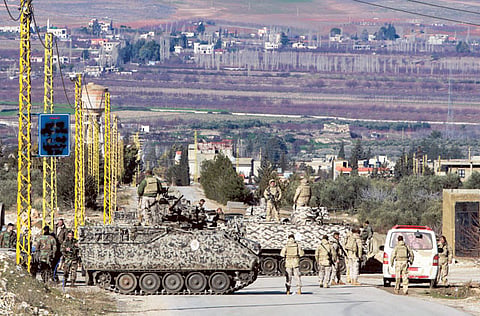Will Lebanon need a new Taif Accord?
Saving and safeguarding Lebanon by preventing interference

Taif is a name connected to the Taif Accord, which was signed in 1989 and ended the 15-year civil war in Lebanon. The accord — much like the reconciliation between enemy brothers — was negotiated in Taif, Saudi Arabia, which patronised the national reconciliation agreement between rival Lebanese groups that put an end to the long and bloody civil war that claimed the lives of a large number of Lebanese and Palestinians. Apart from its catastrophic consequences at the domestic level, the war also led to the weakening of Lebanon’s community fabric and fragile security, leaving the door wide open for Zionist entity to wreak havoc after invading Lebanon twice.
In 1978, the Jewish state invaded southern Lebanon and installed a puppet government called the ‘Free Lebanon State’, headed by Saad Haddad, commander of the Israel-backed South Lebanon Army. During the 1975-1990 war, the Jewish state took advantage and turned waterways from south Lebanon into the north of the Occupied Territories. It also launched large-scale offensives against the Palestinian resistance that led to the killing of a number of its leaders during the invasion of Lebanon in 1982, expelling the Palestinian groups from Lebanon and committing several massacres — most notably the Sabra and Shatila massacre — in collaboration with its Lebanese allies.
Today, 25 years after the war came to an end, some exclude the possibility of repeating the same mistakes made by Lebanese politicians and leaders who pushed Lebanon to the brink, which finally slipped into the civil war that time. However, all facts on the ground do not exclude the potential return of the civil war ghost, because some current politicians did not experience the horrors of the war and the foreign forces that were governing the war have changed or their interests have changed. It is also because the political landscape of domestic forces in Lebanon has changed and their interests have changed too.
The French colonisers, who took control of Lebanon under the Sykes–Picot Agreement, wanted Lebanon to be a Christian community. Although the majority of Lebanese Christians opted to be with the resistance against the French colonisation, French political forces did not conceal their obligations and guarantee to ensure Lebanon’s Christian domination during the late stage of French colonialism and the era after that. Accordingly, France has long been influential in Lebanese political decisions and consequently had a clear impact during the civil war and also on the Taif Agreement.
Egypt was also present in the Lebanese scene, when pan-Arab nationalism prevailed in the 1950s and 1960s before the civil war in Lebanon — where strong Arab national sentiments were clearly evident after the 1952 Egyptian Revolution. Lebanon was the arena where all Lebanese parties competed to demonstrate their sincere loyalty and allegiance to Arab nationalism, as Egypt had its strong influence in the Lebanese decision-making process at that time, as well as on the Palestinian presence in both the resistance as well as refugees.
The US also retained a presence in Lebanon either directly or through the Zionist entity. However, the US strategically preferred to get out of the Lebanese quagmire after the bombing of the US Marine barracks, which left more than 80 American soldiers dead.
Later on, stability in Lebanon was a Zionist American demand, especially after the Jewish entity achieved most of its goals dedicated to protecting its northern borders, thought to be a buffer zone in the South. The Arab presence had a profound effect on the Lebanese political scene before and during the war.
Under the Taif Agreement, both the Arab Syrian and Iraqi Baath party were strongly represented and the Syrian army was present with the consent of all Arabs and with the Zionist-American consent under specific conditions.
On the domestic front, Christian forces dominated the Lebanese political decision-making process since the independence of Lebanon, when powers were established on a sectarian basis and Muslims were significantly marginalised despite having the prime minister’s seat.
During the civil war, new forces emerged, most notably a Palestinian presence and its supporters on the Lebanese front, as well as Sunnis who shared Beirut with Christians and the impressive emergence of Shiites led by the Shiite Amal movement. Following the Iranian Revolution, Hezbollah emerged as a strong player on the country’s political landscape. The Lebanese community was divided along geographical and ethnic lines — between pro-Syria and Iran groups and pro-Israelis as well as others who were only interested to serve their own interests.
Today, after the power centres have changed and nothing is left from the past, except the effect of a Zionist-American will and the Iranian influence, it seems that Lebanon is in need of a new Taif and an intra Lebanese accord. Lebanon desperately needs a real reconciliation that saves it from a possible war led by forces faced by major challenges inside and outside Lebanon. The outside forces are trying hard to transfer the battle to Lebanon.
Will veteran Arab politicians and sincere ones allow once again the malicious groups and the enemies of Lebanon to practice their dirty and bloody rituals on Lebanon’s territories as their ancestors and agents had done before? Or, will they reconcile to save and safeguard Lebanon by preventing interference in its affairs and opt to choose a modern way of dealing with issues and work together in building the future? Only time will tell.
Dr Khalifa Rashid Al Sha’ali is an Emirati writer who specialises in legal affairs.



